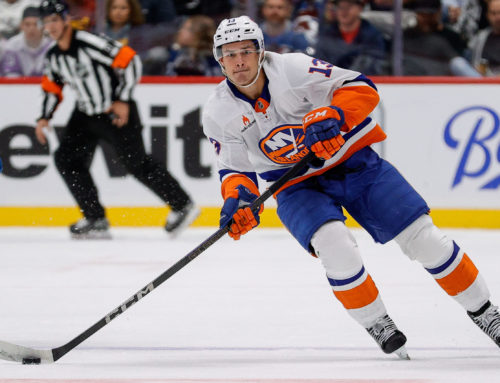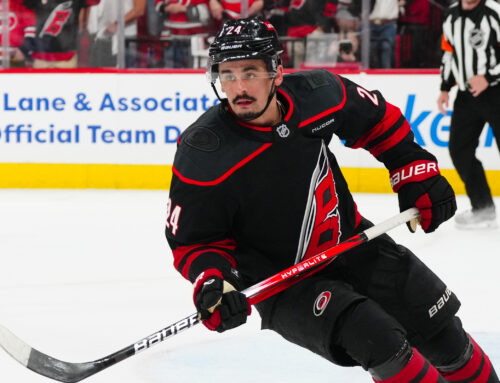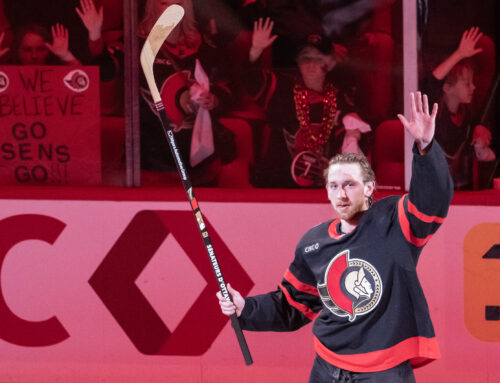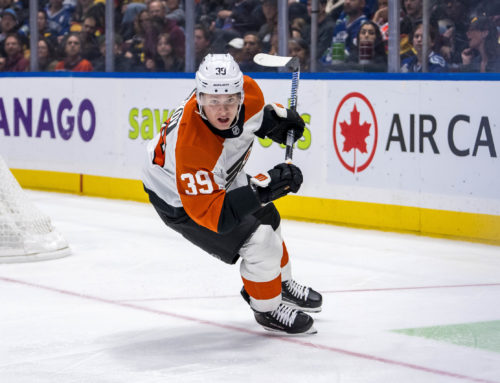In this week's Eastern Edge, we'll take a look at power-play production from defensemen across the Eastern Conference. In particular, we'll take a look at Torey Krug's anticipated departure from Boston and how that may affect his fantasy hockey value. You'll also see a few notes on Ivan Provorov and Thomas Chabot. There's definitely a lot more to talk about, so let me know if you'd like to see a Part Two!
| Rank | Player | GP | PPG | PPA1 | PPA2 | PPP | PP Shots | PP TOI/GP | PP TOI% |
| 1 | Torey Krug | 61 | 2 | 16 | 10 | 28 | 44 | 3:53 | 73.6 |
| 2 | John Carlson | 69 | 2 | 17 | 7 | 26 | 38 | 4:01 | 74.7 |
| 3 | Victor Hedman | 66 | 4 | 9 | 9 | 22 | 39 | 3:06 | 62.5 |
| 4 | Keith Yandle | 69 | 2 | 8 | 11 | 21 | 41 | 3:42 | 73.7 |
| T5 | Rasmus Dahlin | 59 | 2 | 12 | 5 | 19 | 32 | 3:22 | 70.1 |
| T5 | Tony DeAngelo | 68 | 3 | 8 | 8 | 19 | 33 | 3:05 | 58.2 |
| 7 | Ivan Provorov | 69 | 7 | 4 | 5 | 16 | 39 | 3:03 | 56.7 |
| 8 | Kris Letang | 61 | 6 | 5 | 4 | 15 | 34 | 3:31 | 69.5 |
| T9 | Zach Werenski | 63 | 5 | 3 | 5 | 13 | 33 | 2:44 | 60.7 |
| T9 | Matt Niskanen | 68 | 4 | 6 | 3 | 13 | 26 | 2:03 | 38.5 |
| T9 | Mikhail Sergachev | 70 | 5 | 3 | 5 | 13 | 31 | 1:53 | 37.8 |
| T9 | Adam Fox | 70 | 1 | 7 | 5 | 13 | 23 | 1:59 | 37.2 |
| T13 | Dougie Hamilton | 47 | 2 | 5 | 5 | 12 | 41 | 3:10 | 63.8 |
| T13 | Jeff Petry | 71 | 3 | 6 | 3 | 12 | 31 | 2:24 | 53.6 |
| T13 | Tyson Barrie | 70 | 1 | 4 | 7 | 12 | 19 | 2:40 | 59.2 |
| T16 | Thomas Chabot | 71 | 0 | 5 | 6 | 11 | 27 | 3:15 | 65.2 |
| T16 | Jake Gardiner | 68 | 1 | 6 | 4 | 11 | 16 | 1:47 | 36.6 |
| T18 | Damon Severson | 69 | 3 | 2 | 5 | 10 | 29 | 1:59 | 36 |
| T18 | Sami Vatanen | 47 | 1 | 5 | 4 | 10 | 30 | 3:03 | 52.8 |
| T18 | Filip Hronek | 65 | 1 | 4 | 5 | 10 | 33 | 2:53 | 54.8 |
| T21 | Mike Reilly | 44 | 1 | 3 | 5 | 9 | 15 | 1:38 | 34.4 |
| T21 | Seth Jones | 56 | 2 | 4 | 3 | 9 | 19 | 2:34 | 52 |
| T21 | Rasmus Ristolainen | 69 | 2 | 4 | 3 | 9 | 20 | 2:20 | 47.7 |
| T24 | Shea Weber | 65 | 3 | 0 | 5 | 8 | 31 | 2:10 | 49.1 |
| T24 | Jacob Trouba | 70 | 4 | 0 | 4 | 8 | 23 | 1:47 | 33.5 |
| T26 | Kevin Shattenkirk | 70 | 1 | 3 | 3 | 7 | 20 | 1:22 | 27.5 |
| T26 | Matt Grzelcyk | 68 | 1 | 2 | 4 | 7 | 14 | 1:33 | 30.1 |
| T26 | Morgan Rielly | 47 | 0 | 3 | 4 | 7 | 17 | 2:20 | 52.7 |
| T29 | P.K. Subban | 68 | 2 | 0 | 4 | 6 | 30 | 2:21 | 42.7 |
| T29 | Aaron Ekblad | 67 | 0 | 4 | 2 | 6 | 17 | 1:27 | 28.4 |
| T29 | Devon Toews | 68 | 1 | 1 | 4 | 6 | 23 | 2:14 | 53.6 |
| T29 | Justin Schultz | 46 | 0 | 2 | 4 | 6 | 17 | 2:45 | 53.2 |
| T33 | Shayne Gostisbehere | 42 | 1 | 0 | 4 | 5 | 21 | 2:38 | 47.4 |
| T33 | Dennis Cholowski | 36 | 1 | 1 | 3 | 5 | 8 | 2:40 | 53.1 |
| T33 | Dmitry Orlov | 69 | 1 | 3 | 1 | 5 | 6 | 1:25 | 26.1 |
| T36 | Travis Sanheim | 69 | 0 | 1 | 3 | 4 | 10 | 0:54 | 16.9 |
| T36 | Nick Leddy | 60 | 1 | 1 | 2 | 4 | 8 | 1:10 | 27.9 |
| T36 | John Marino | 56 | 1 | 2 | 1 | 4 | 2 | 0:45 | 15 |
| T39 | Colin Miller | 51 | 0 | 1 | 2 | 3 | 10 | 1:22 | 28.3 |
| T39 | Jaccob Slavin | 68 | 0 | 1 | 2 | 3 | 8 | 0:55 | 18.7 |
Torey Krug led all defenseman in power-play production during the regular season. In fact, Krug outscored most forwards on the power play, as only Leon Draisaitl, Connor McDavid, David Pastrnak, Nathan MacKinnon and Jonathan Huberdeau had more points with the man advantage. Krug doesn't have a contract for next season yet, but his power-play dominance and offensive production certainly give him a lot of power at the negotiating table. It sounds like many teams are interested in trading for Krug's rights, so they can sign a contract with the 29-year-old defenseman before he hits the open market. Given this information, as well as the fact that Krug hasn't accepted Boston's reported offer of $6.5 million for six years, it seems unlikely that Krug will be a Bruin next season.
So, how would a change of scenery affect Krug's power-play totals and fantasy hockey value?
It's an interesting question, because Krug's point totals have been boosted by strong power-play production over the past few years. In Boston, he had the luxury of playing alongside three incredibly talented forwards on the power play – Brad Marchand, Patrice Bergeron and David Pastrnak. That power-play unit was made all the more dangerous because Marchand, Bergeron and Pastrnak also played together at even-strength. So, they brought a special level of chemistry to the power play which made the Bruins even more lethal with the man advantage.
Krug held a prominent power-play role in Boston, as he was on the ice for 73.6-percent of the team's total time on the man advantage. He was clearly the most talented offensive defenseman on the Bruins' roster, so he didn't have much competition for the role of top power-play defenseman. However, many teams that are reportedly interested in Krug already have strong offensive options on the blueline. Colorado has Cale Makar and Sam Girard, Florida has Keith Yandle, and Vegas has Shea Theodore. So, there's a chance that Krug's power-play role sees a slight reduction if he leaves Boston and joins a team with more internal competition. With that being said, you don't get a screwdriver to hammer in a nail. If you're trading for Krug, you know that his offensive ability is his best asset – so any team that acquires Krug should provide him with an adequate role on the power-play.
Overall, I think that Krug's fantasy value could drop slightly if he leaves Boston. The way I see it, he'd be leaving a star-studded power-play unit, on which he saw the lion's share of ice time. At best, he finds a similar situation somewhere else, but I think it's more likely that he ends up in a slightly worse situation – with either a less-talented forward corps, or a reduced opportunity due to more internal competition on the blueline.
Now, how would the Bruins be affected by Krug's departure?
During this past regular season, Krug missed a stretch of five games in November with an upper-body injury. During that time, Matt Grzelcyk stepped up in a big way – recording two goals and two assists in those five games. In addition, the Bruins' power-play still managed to score without Krug in the lineup, capitalizing on four of their 11 opportunities (36.4-percent) over those five games.
When an ankle injury caused Krug to miss the first 11 games of Boston's 2018-2019 campaign, the Bruins power-play still managed an above-average conversion rate of 28.1-percent, as they scored on 9 of their 32 chances. During those 11 games, Grzelcyk managed five points – three of which were scored with the man advantage. I know the sample size is small, but I could see the Bruins giving Grzelcyk a shot on the top power-play unit if Krug leaves. Charlie McAvoy represents another option for the team's top power-play unit if the Bruins opt to fill Krug's absence internally – but it's also possible that they look for replacements through trade or free agency.
Overall, I think that Marchand, Bergeron and Pastrnak can continue to thrive on the power-play in Krug's absence. I'm not saying that you could throw anyone on their unit and they'd still dominate on the power-play – because that would be disrespecting Krug's contributions over the last few years – but I do think they possess enough talent among themselves to continue producing if Krug leaves.
~
Ivan Provorov scored seven goals with the man advantage – representing the highest power-play goal total of all defenseman (in both the Eastern and Western Conference). This season marked the first time that Provorov was given the reins on the power play, as Shayne Gostisbehere had been Philly's top power-play defenseman over the past few years. With Gostisbehere struggling, Provorov took over Philly's top unit –
averaging three minutes of power-play ice time per game. It was a significant jump for Provorov, who had been averaging less than two minutes of ice time with the man advantage during past seasons. Provorov made the most of the new opportunity, tallying an impressive 16 power-play points through 69 games. As a defenseman who could contribute shots, blocks and points to your fantasy roster, Provorov had already been a valuable asset – but he becomes even more valuable with this new element of power-play production.
~
It seems unrealistic to expect much power-play production from Thomas Chabot until Ottawa's forward corps improves significantly – whether that be through player development or the injection of new personnel. Chabot tallied 16 power-play points through 70 games last year, when he still had strong offensive options in Matt Duchene and Mark Stone for the majority of the campaign, before they were eventually shipped off at the trade deadline. This past season, Chabot's only managed 11 points with the man advantage through 71 appearances. Ottawa was shockingly bad on the power play, scoring on a league-worst 14.2-percent of their opportunities. It's hard to envision much improvement in Chabot's power-play numbers next year, but he could be a good sleeper pick if your fellow fantasy managers want to avoid him just because he plays for a struggling team.
~
Last week’s Eastern Edge: goaltending storylines from the regular season





 CHI
CHI SEA
SEA FLA
FLA DAL
DAL WPG
WPG CBJ
CBJ L.A
L.A MIN
MIN DET
DET COL
COL
